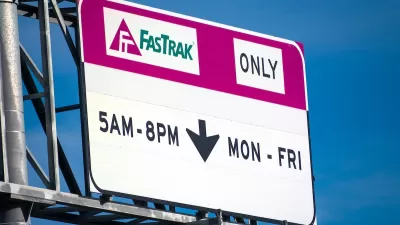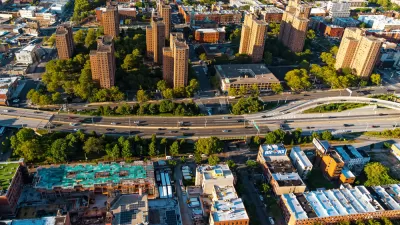State transportation officials say a proposed road expansion project would reduce congestion — if coupled with transit initiatives.

Maine transportation advocates are calling on state officials to reject a highway expansion proposal that state transportation officials claim would reduce carbon emissions, reports Annie Ropeik for Energy News. “The toll road aims to offer a more direct route from Portland’s growing suburbs into the city, bypassing local roads that officials say weren’t designed to accommodate increasing commuter traffic.” A Maine Turnpike Authority (MTA) spokesperson say the Gorham Connector project is part of “a multi-pronged approach” that also includes land use and transit initiatives.
According to Benito Pérez, the policy director of the nonprofit Transportation for America, any emissions reduction benefits are ‘negligible.’ “Pérez pointed to examples in the Washington, D.C. area, Salt Lake City and elsewhere where highway expansions that aimed to reduce gridlock instead led to more traffic and further need for expansions years later — a paradox known as ‘induced demand.’”
A 2012 study recommended the project in addition to changes to roads, transit, and land use and development patterns, but advocates say “these other efforts are moving more slowly and with less state support than the Connector has received, putting these parallel solutions out of step with each other.” According to Pérez, “The mindset is, ‘we’re designing for vehicles,’ and that’s what they’re measuring for, not measuring for the movement of people.”
FULL STORY: Critics, studies cast doubt on Maine’s claims of climate benefits from highway expansion

Maui's Vacation Rental Debate Turns Ugly
Verbal attacks, misinformation campaigns and fistfights plague a high-stakes debate to convert thousands of vacation rentals into long-term housing.

Planetizen Federal Action Tracker
A weekly monitor of how Trump’s orders and actions are impacting planners and planning in America.

In Urban Planning, AI Prompting Could be the New Design Thinking
Creativity has long been key to great urban design. What if we see AI as our new creative partner?

King County Supportive Housing Program Offers Hope for Unhoused Residents
The county is taking a ‘Housing First’ approach that prioritizes getting people into housing, then offering wraparound supportive services.

Researchers Use AI to Get Clearer Picture of US Housing
Analysts are using artificial intelligence to supercharge their research by allowing them to comb through data faster. Though these AI tools can be error prone, they save time and housing researchers are optimistic about the future.

Making Shared Micromobility More Inclusive
Cities and shared mobility system operators can do more to include people with disabilities in planning and operations, per a new report.
Urban Design for Planners 1: Software Tools
This six-course series explores essential urban design concepts using open source software and equips planners with the tools they need to participate fully in the urban design process.
Planning for Universal Design
Learn the tools for implementing Universal Design in planning regulations.
Appalachian Highlands Housing Partners
Gallatin County Department of Planning & Community Development
Heyer Gruel & Associates PA
Mpact (founded as Rail~Volution)
City of Camden Redevelopment Agency
City of Astoria
City of Portland
City of Laramie





























